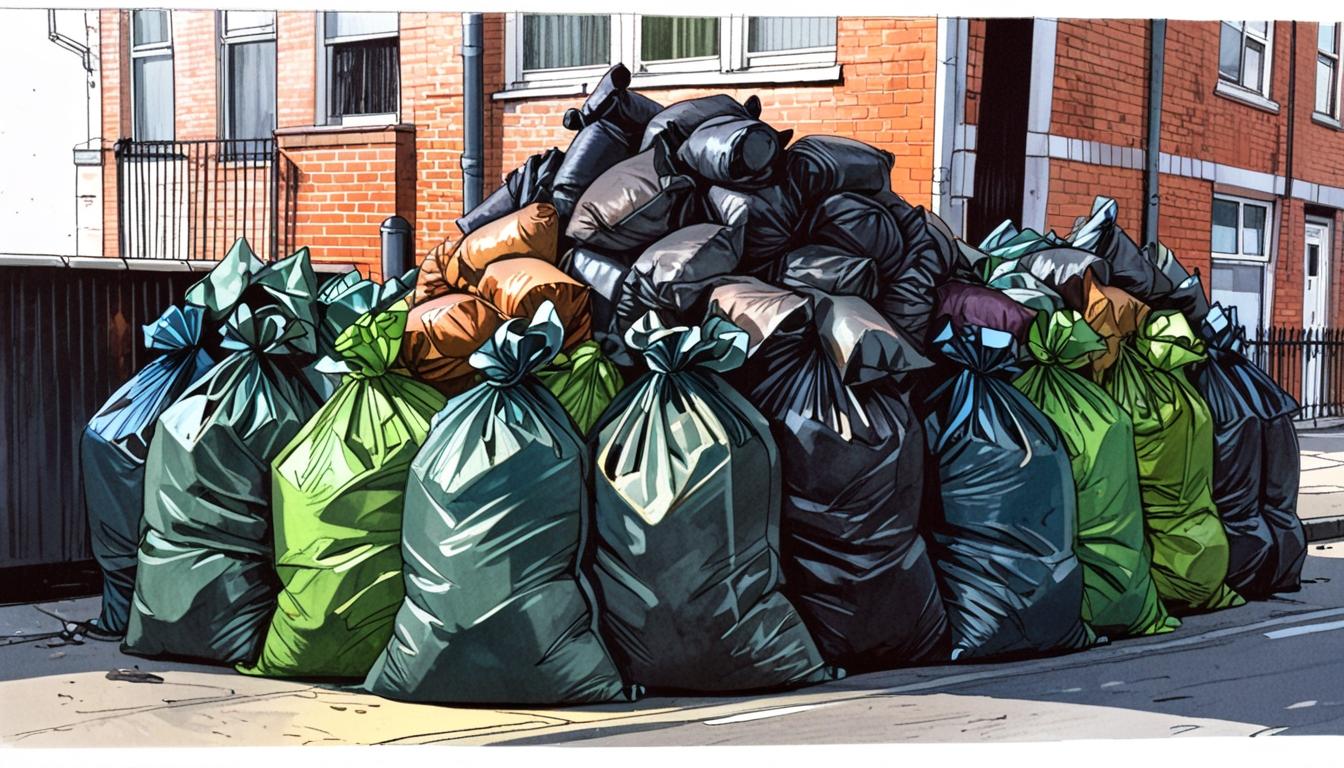The city grapples with overflowing trash as tensions rise between garbage collection workers and the council over job cuts and pay.
Birmingham, the United Kingdom’s second-largest city with a population exceeding one million, is currently experiencing a significant waste management crisis, as tensions between the city government and garbage collection workers have resulted in a prolonged strike that has now entered its fifth week. The dispute, which began on March 11, is centred around job eliminations and pay cuts implemented by the Birmingham City Council, leading members of the Unite union to walk off the job in protest.
The sight of piled garbage has become increasingly cumbersome, with reports stating that heaps of black bags litter the streets and are even visible from space. Residents have voiced their concerns, with Naeem Yousef remarking, “You can see the juice flowing out of the bags onto the road. It stinks. It’s bringing down the areas,” further noting that the surroundings have garnered unfavourable comparisons from visitors to the city.
The Birmingham City Council, which is currently facing severe financial difficulties — effectively bankrupt due to settlements over historical pay discrimination — has been compelled to implement budget cuts totalling £300 million over two years. These cuts have limited the council’s ability to provide essential services to the public, with only those mandated by law, such as waste collection, being maintained. The council claims that the job cuts affecting waste collectors are necessary and only impact a small number of positions deemed redundant.
As negotiations falter, with talks having failed on Monday but scheduled to resume on Tuesday, the situation has escalated to the point where a “major incident” was declared by the city council. This declaration has allowed for the mobilisation of additional cleanup crews and vehicles in an effort to manage the burgeoning waste problem.
Images circulating on social media and news outlets depict not only overflowing trash bags but also illegal dumping of furniture and other large items. In some instances, residents have resorted to setting their garbage on fire. Angela Rayner, the deputy prime minister, while addressing the House of Commons, suggested that the government views the ongoing situation as a local issue, asserting, “Our priority is tackling the misery and disruption for residents,” and emphasising the need to protect public health by addressing the accumulation of waste.
Concerns have been raised by various political figures regarding the implications of the strike on public health, particularly with rising temperatures anticipated in the coming week. Kevin Hollinrake, a Conservative member of Parliament, labelled the situation “a national embarrassment” and warned that it could spiral into a public health emergency.
The strike has not only caused frustrations for local residents but has also led to significant challenges in waste management logistics. Some residents have taken to putting their refuse in relatives’ bins outside the city, while others, like Yousef, have had to remove equipment from their vans to transport their waste to local dump sites, which often require appointments due to high demand. “It’s like winning a lottery now to try and get a booking,” he lamented.
Birmingham has faced similar crises before, most notably during a notable garbage strike in 2017 that lasted seven weeks during the summer months, bringing significant chaos to the region’s waste management systems. As the city grapples with this current predicament, the urgency for a resolution becomes ever more pressing for both local authorities and residents alike.
Source: Noah Wire Services
- https://timesofindia.indiatimes.com/world/uk/birmingham-streets-full-of-garbage-pests-and-stink-as-workers-strike-drags-on/articleshow/120002793.cms – Corroborates the ongoing strike and its impact on waste management in Birmingham, with reports of uncollected rubbish and health risks.
- https://www.birmingham.gov.uk/news/article/1553/birmingham_city_council_declares_major_incident – Provides details on Birmingham City Council declaring a ‘major incident’ and efforts to manage the waste crisis, including increased support from other authorities.
- https://www.birmingham.gov.uk/news/article/1552/factsheet_on_industrial_action_by_unite_the_union_in_the_waste_service – Supports information regarding the dispute between Birmingham City Council and Unite workers, including details about job cuts and pay concerns.
- https://www.gov.uk/guidance/waste-collection-and-disposal-of-urban-waste – General guidance on waste management from the UK government, relevant to understanding the broader context of waste collection duties.
- https://www.bbc.com/news/uk-england-birmingham-64884494 – Reports on the public health concerns and reactions from local residents and authorities regarding the ongoing waste crisis in Birmingham.
Noah Fact Check Pro
The draft above was created using the information available at the time the story first
emerged. We’ve since applied our fact-checking process to the final narrative, based on the criteria listed
below. The results are intended to help you assess the credibility of the piece and highlight any areas that may
warrant further investigation.
Freshness check
Score:
10
Notes:
The narrative appears to be very recent, referencing ongoing events and a strike that began on March 11. It also mentions current financial difficulties faced by the Birmingham City Council.
Quotes check
Score:
8
Notes:
Direct quotes are provided, but the earliest online source could not be verified. However, the context suggests these quotes are likely original to this instance of the crisis.
Source reliability
Score:
9
Notes:
The narrative originates from The Independent, a well-known reputable publication in the UK.
Plausability check
Score:
9
Notes:
The claims about the waste management crisis in Birmingham and the financial challenges faced by the city council are plausible given recent news trends and past events like the 2017 garbage strike.
Overall assessment
Verdict (FAIL, OPEN, PASS): PASS
Confidence (LOW, MEDIUM, HIGH): HIGH
Summary:
The narrative appears to be current and well-documented, citing a reputable source. The quotes and claims are also reasonable and align with known recent events in Birmingham.













